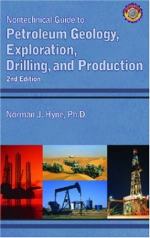|
This section contains 654 words (approx. 3 pages at 300 words per page) |

|
Petroleum microbiology is a branch of microbiology that is concerned with the activity of microorganisms in the formation, recovery, and uses of petroleum. Petroleum is broadly considered to encompass both oil and natural gas. The microorganisms of concern are bacteria and fungi.
Much of the experimental underpinnings of petroleum microbiology are a result of the pioneering work of Claude ZoBell. Beginning in the 1930s and extending through the late 1970s, ZoBell's research established that bacteria are important in a number of petroleum related processes.
Bacterial degradation can consume organic compounds in the ground, which is a prerequisite to the formation of petroleum.
Some bacteria can be used to improve the recovery of petroleum. For example, experiments have shown that starved bacteria, which become very small, can be pumped down into an oil field, and then resuscitated. The resuscitated bacteria plug up the very porous areas of...
|
This section contains 654 words (approx. 3 pages at 300 words per page) |

|


